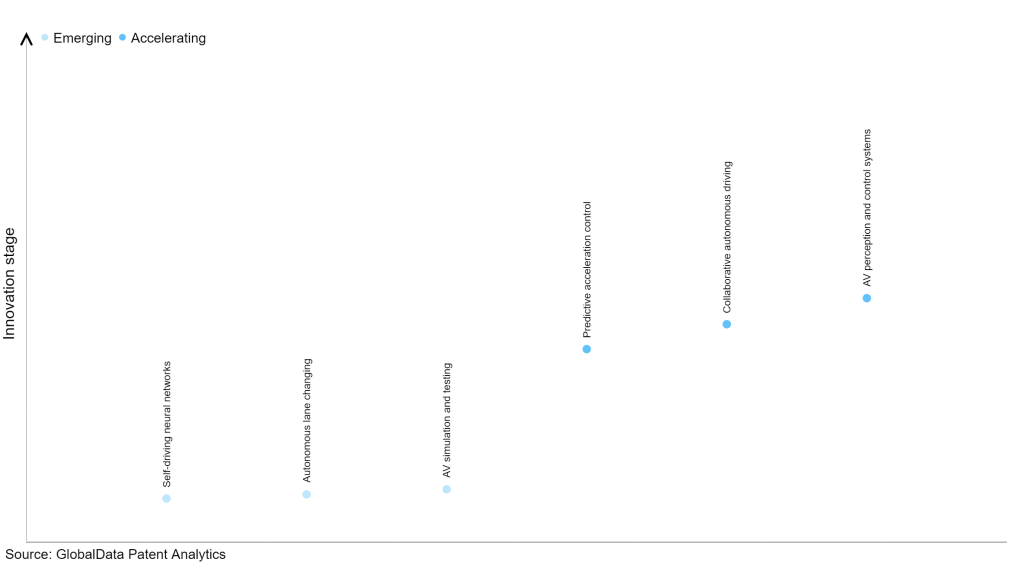The automotive industry continues to be a hotbed of patent innovation. Activity is driven by demand for intelligent and connected cars that are safer and offer enhanced driving experience, as well as the increasing importance of technologies such as electric, connected and autonomous vehicles. Adaptive cruise control with its capability to constantly monitoring information related to speed limits, road curvature, and more, is growing as a preferred choice both among OEMs and customers owing to comfort, convenience and safety it brings on board. In the last three years alone, there have been over 720,000 patents filed and granted in the automotive industry, according to GlobalData’s report on Artificial intelligence in automotive: adaptive cruise control. Buy the report here.

Discover B2B Marketing That Performs
Combine business intelligence and editorial excellence to reach engaged professionals across 36 leading media platforms.
However, not all innovations are equal and nor do they follow a constant upward trend. Instead, their evolution takes the form of an S-shaped curve that reflects their typical lifecycle from early emergence to accelerating adoption, before finally stabilizing and reaching maturity.
Identifying where a particular innovation is on this journey, especially those that are in the emerging and accelerating stages, is essential for understanding their current level of adoption and the likely future trajectory and impact they will have.
300+ innovations will shape the automotive industry
According to GlobalData’s Technology Foresights, which plots the S-curve for the automotive industry using innovation intensity models built on over one million patents, there are 300+ innovation areas that will shape the future of the industry.
Within the emerging innovation stage, self-driving neural networks, autonomous lane changing and AV simulation and testing are disruptive technologies that are in the early stages of application and should be tracked closely. Predictive acceleration control, collaborative autonomous driving, and AV perception and control systems are some of the accelerating innovation areas, where adoption has been steadily increasing.
Innovation S-curve for artificial intelligence in the automotive industry

Adaptive cruise control is a key innovation area in artificial intelligence
Adaptive cruise control functions to control a vehicle without the driver's direct inputs, by analyzing the speed of the vehicle in front. It can then modify the speed of the car accordingly to avoid any incidence of crash.
GlobalData’s analysis also uncovers the companies at the forefront of each innovation area and assesses the potential reach and impact of their patenting activity across different applications and geographies. According to GlobalData, there are 255+ companies, spanning technology vendors, established automotive companies, and up-and-coming start-ups engaged in the development and application of adaptive cruise control.
Key players in adaptive cruise control – a disruptive innovation in the automotive industry
‘Application diversity’ measures the number of applications identified for each patent. It broadly splits companies into either ‘niche’ or ‘diversified’ innovators.
‘Geographic reach’ refers to the number of countries each patent is registered in. It reflects the breadth of geographic application intended, ranging from ‘global’ to ‘local’.
Porsche Automobil is one of the leading innovators in adaptive cruise control systems. The adaptive cruise control feature found in the Porsche 911 allows to maintain a safe distance from the vehicle in front, detecting early when other road users are cutting in. The system can also bring the Porsche 911 to a complete stop when necessary and accelerate back up to the desired cruising speed once the road is clear. Other leading patent filers in the adaptive cruise control space include Toyota Motor, Ford Motor, and Hyundai Motor.
In terms of application diversity, INRIX held the top position, while State Farm Mutual Automobile Insurance and Bridgestone stood in second and third positions, respectively. By means of geographic reach, INRIX leads the pack, followed by Bridgestone and KPIT Technologies.
To further understand how artificial intelligence is disrupting the automotive industry, access GlobalData’s latest thematic research report on Artificial Intelligence (AI) in Automotive.
Data Insights
From

The gold standard of business intelligence.
Blending expert knowledge with cutting-edge technology, GlobalData’s unrivalled proprietary data will enable you to decode what’s happening in your market. You can make better informed decisions and gain a future-proof advantage over your competitors.





